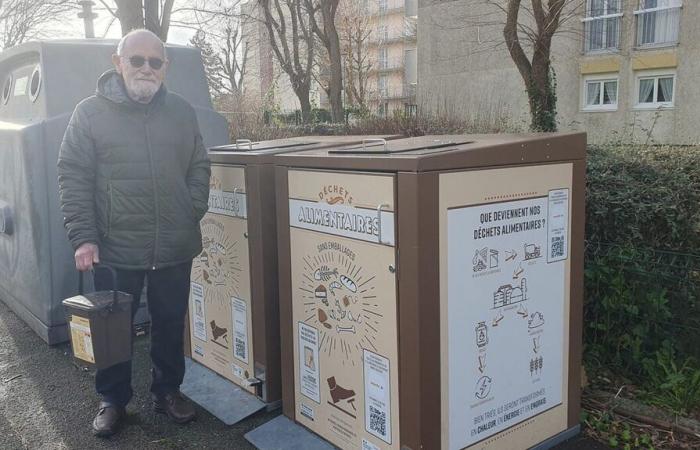Vegetable peelings, leftover fish or meat, egg shells… For the past year, the French have had to have a way to sort their bio-waste, that is to say their food waste. The anti-waste law requires municipalities to offer their residents a sorting solution. But a year after the law came into force, this sorting still only concerns a minority of French people.
You just need to visit a bio-waste recovery center to see this. In Île-de-France, in Stains (Seine-Saint-Denis), the Moulinot company is far from being at its maximum capacity, as summarized in a very clear image by director Sébastien Roussel: “I think we took the highway on the right side, but we’re going at 30 km/h.”
The trucks brought back 30,000 tonnes of food waste in 2024. They are sorted and cleaned, then the preparation is sent to agricultural methanizers for the manufacture of biogas and fertilizer. But this Stains site could process twice as much bio-waste. “There are a few communities that are leading the waybelieves Sébastien Roussel. They really had a very strong ambition for sorting food waste, by offering either door-to-door collection or collection at voluntary drop-off points. There are other communities which are, let’s say, still very shy.”
This looks like the beginning of sorting plastic and cardboard, which also took time to settle in and become a habit. “We deployed packaging sorting on a large scale in France from 1998-2000, and it took ten to 15 years to have larger volumesexplains the Ile-de-France regional director of Moulinot. Today, who would think of not sorting plastic and paper in their trash?”
There is still a way to go. Bio-waste still represents a third of the content of household waste. One year after the sorting obligation, only around 40% of French people have a means of collection.
However, there are good students. In Normandy, in Sotteville-lès-Rouen where the collection was launched a year ago. Since then, Claude and his neighbor Marie-Claude have adopted new habits. “We got the little trash can at the town halldescribes Marie-Claude. I put my peelings in it which I will put where they put a container for bio-waste.” She did not notice any nuisances. A year ago, residents feared rats and odors. “This summer, we had a few smells, but not more than that, because in the summer, they passed twice”she explains.
But not all residents sort things well. “There are some people who use plastics. There, it’s the same, there’s no real reason to be”explains Claude, pointing to some paper in the bio-waste bin. “We are not going to put a surveillance agent behind each trash can.” Of the 900 collections made during the year, only around forty could not be recycled and were sent to incineration due to poor sorting. The proof, according to Mayor Alexis Ragache, that this habit has become part of our customs. “Obviously, that’s what experimentation is for. There were some changes that were made, either to the layout or to the hardware itself. But overall, it was very successful.
-“We still see that our fellow citizens had a civic spirit and were aware that it was necessary to all engage in this approach to a more sustainable and sustainable city, in particular through this waste management.”
Alexis Ragache, mayor of Sotteville-lès-Rouenat franceinfo
Sotteville-lès-Rouen will therefore increase the number of voluntary drop-off bins. There were initially only 25 for 3,000 households. There will soon be 70 to cover the entire city. But residents of other municipalities in the Rouen metropolitan area will have to wait. The Metropolis is giving itself three years to deploy 1,000 bins.
Some communities deplore a lack of support from the State, because this collection of bio-waste comes at a cost. It represents an investment of 10 to 20 euros more per inhabitant. This is not insignificant according to Nicolas Garnier, general delegate of Amorce, an association of local authorities engaged in the ecological transition: “The State is always very strong in imposing things on local authorities. But in this matter, it has been almost absent in terms of financial support. If we have to explain to the French why they do not have sorting at source of bio-waste is that local elected officials are in a situation of cost control on the household waste removal tax. So being already almost halfway there in the year of the deadline is rather a. good result from our point of view. We have to accept the idea that in the next few years we will finish the work.”
In the meantime, more than five million tonnes of recoverable food waste continue to be landfilled or incinerated.






